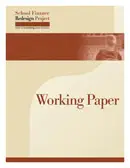In response to concerns about the quality of the teacher workforce and the distribution of teacher quality among schools, some advocates, policymakers, and analysts have proposed alternative pay structures for teachers, including merit pay and incentives for hard-to-hire subject areas, hard-to-staff schools, and special knowledge and skills. Past attempts to gauge teacher attitudes about compensation reforms have produced largely inconsistent results. A possible explanation for the inconsistent pattern of results is that most prior research largely ignores individual and workplace characteristics that are likely to inform teacher attitudes about pay reform.
This paper describes research designed to shed additional light on how teachers feel about different pay and incentive reforms. By linking results from an original survey of Washington State teachers to detailed data on school and district characteristics, we are able to analyze how teacher opinions differ by individual characteristics (e.g., subject area, school assignment, experience) as well as workplace characteristics (e.g., school performance and professional collegiality).
Contextualizing teachers’ opinions, our findings indicate that policymakers interested in implementing compensation reforms should think carefully about where (and how) they place their bets. For instance, we find veteran teachers are generally less supportive of compensation reforms than novice teachers while support for various pay reforms, especially merit pay and subject-area pay, varies among secondary and elementary school teachers.
A version of this paper was published in Industrial & Labor Relations Review, 64(3): 441-463. (2011).






